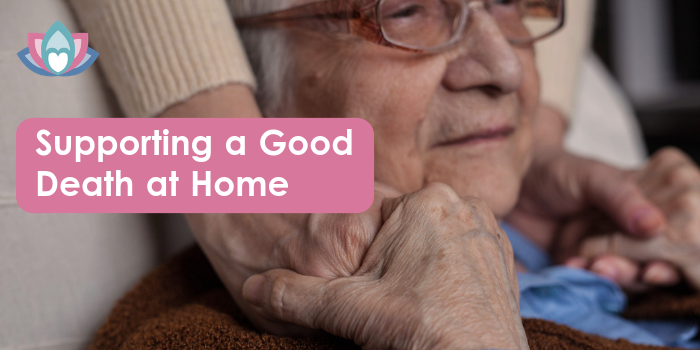
National Office
Please enter the office location/term above to receive results for your closest office as well as information matches

If you were given the choice of where you’d like to die, would at home, surrounded by your loved ones, be one of your first thoughts?
For many of us, the reassurance of knowing family are close by, or seeing something as simple as a favourite view from a bedroom window can bring peace and happiness to a loved one’s final days – which is why many more people are choosing to receive palliative care at home when they are diagnosed with a terminal illness.
So, what are the options open to those who wish to die at home?
First of all, what do we mean by a ‘Good Death’?
In an attempt to answer this, bereaved carers and voluntary sector organisations to try to identify what makes a good death, which they have defined as follows:
“A good death is the best death that can be achieved in the context of the individual’s clinical diagnosis and symptoms, as well as the specific social, cultural and spiritual circumstances, taking into consideration patient and carer wishes and professional expertise.”
In order to achieve a good death, there must be the following attributes to any service supporting someone at the end of life:
We are professionally led and can liaise with your GP and community health services to assist you put an ‘Advanced Care Plan’ in place, which amongst other things will state:
It is very important to include the GP of your loved one in the decision to die at home as they may feel, knowing the full health history of the person involved, whether this is the best option.
And although Radfield Home Care offers palliative care, it may be necessary to include the help of hospice at home service, social workers and spiritual support services, depending on your beliefs.
Once it’s been decided that dying at home is the right choice for you or your loved one, it’s time to consider the amount of support needed. At first, this can be minimal, from a carer picking up prescriptions, medication, shopping or doing some light housework. However, as a condition worsens, there may be no choice but to receive more help.
This can include:
Many people choose these options as staying at home helps them to keep their independence until their death. Our carers are fully trained and offer as little or as much help as is needed and our hourly or overnight care services also include assistance with:
And much more.
Eric and Mary were married for 40 years, but in 2017, Mary was diagnosed with cancer for the second time. After a lot of thought, Mary decided she couldn’t go through chemotherapy again. She chose to die on her own terms, in the home that she loved. Her husband Eric explains:
“Mary beat cancer in 2013, and the scare made her live life to the full, so when she was diagnosed again, it was devastating. We contacted Radfield Home Care regarding in-home care during Mary’s final days. They were sensitive, helping us through all the paperwork, including Mary’s wishes and the fact she had put a DNAR in place.
Radfield Home Care was a Godsend because they gave us the flexibility of care to suit us. At first, I coped with the minimum of help. However, as Mary grew more unwell, the respite the Radfield carers offered made a real difference to both of us.”
Mary died on 18th November 2018 at home in bed, looking at her favourite view from her bedroom window surrounded by Eric and their children, Sarah and Graham.
“Mary was happy at the end,” says Eric, “because without Radfield Home Care’s help, she may have passed in away in hospital and I might not have been able to be with her. That’s not what she wanted. She wanted to maintain her independence at home. Mary may not be here now, but I know how much she appreciated everything Radfield’s carers did. As do I.”
Nobody should have to shoulder the burden of taking care of a terminally ill loved one on their own.
Whether you’ve been diagnosed with a terminal illness, or you’re struggling to care for a loved one, Radfield Home Care is only a phone call away.
If Mary and Eric’s story has inspired you to reach out for the support you need, contact us today and speak to one of our friendly staff who’ll advise you on the first steps on how we can support you in providing a good death at home.
Get in touch with your local Radfield Home Care office today and find out more about the support we offer and the difference we can make.